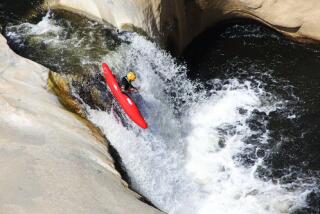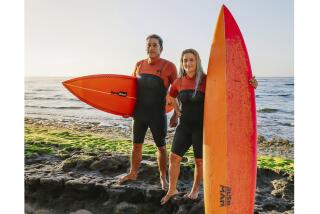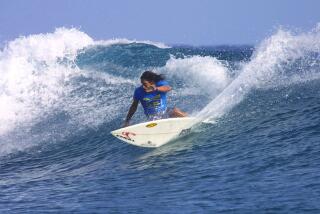Fellow Lifeguards Mourn the Death of ‘Big Mike’
The smile is what people recall most about Mike Knight--that big old bear of a grin that just refused to budge from his face.
And the power of his body, the strapping 6-foot, 4-inch frame that for nine years had sliced through the brisk Pacific waters as the 27-year-old San Diego city lifeguard pulled off one risky ocean rescue after another.
They also remember the drive that Knight harnessed--the long hours of exercise, outside classes and training--that just two weeks ago helped him achieve his dream of being named to the service’s elite river rescue team.
This week, friends say, as he stood atop a boulder, contemplating the thrashing white waters of a river in rural Idaho, the smile was still there as Knight and eight other lifeguards took part in a series of dangerous training exercises.
It was then, in his moment of triumph, that the unpredictable force of nature that had provided the happy-go-lucky lifeguard with his career and, some say, his very reason for being, suddenly claimed him for itself.
As at least one fellow lifeguard looked on helplessly, the Colorado native drowned Monday afternoon after being sucked beneath the surface of the turbulent Payette River--trapped by underwater rocks and logs and a surging current powerful enough to overcome a veteran lifeguard’s strength and training.
Knight’s death, officials say, marks the first time that a lifeguard has died in the line of duty since the service began in San Diego in 1918.
Today, in a brief sunset ceremony expected to be witnessed by hundreds of lifeguards from all along the California coast as well as the mayors of both San Diego and Los Angeles, Knight’s cremated remains will be spread at sea in front of the Mission Beach lifeguard station where he often plied his trade.
“We’re going to put him in the one place where he was always the happiest--in the ocean,” said Lelia Boettcher, Knight’s high school sweetheart and girlfriend of 10 years. “That’s where Mike’s going to remain forever.”
On Thursday, dozens of lifeguards filed through the tiny Pacific Beach home that Knight shared with Boettcher, talking about the athlete who represented the modern lifeguard who does much more than sit on the beach catching rays. And they talked about his smile.
“It was the last thing Mike’s friends and colleagues saw of him,” Boettcher recalled. “He was standing on that rock wearing his wetsuit, jacket, helmet and fins, with his Boogie board under his arm and with that big Michael-like grin on his face. He was just so happy to finally be there.
“And then the next time they looked, he was gone.”
It was still not clear Thursday whether Knight jumped or was swept into the frigid waters. Nonetheless, the untimely tragedy underscored the very real perils of the life-saving profession--including the hazardous work of the elite river rescue team, organized in the late 1970s to quell the rising tide of flood-related deaths in San Diego, officials say.
“Mike’s death brings home something we’ve always known and now can never hope to forget--that rivers are much more dangerous than oceans,” said Capt. Chris Brewster of the city lifeguard service, who wore a black patch over his lifeguard’s badge Thursday to commemorate Knight’s death.
“Out on the ocean, the waves come in pulses. There’s lulls in which you can move away from the power of the ocean. But there are no lulls on a raging river. The power of the river is relentless.”
Brewster said the drowning would doubtless lead to a review of the river rescue techniques--which often employ several lifeguards at a time using inflatable rafts and rescue ropes.
“I’m convinced that the methods used by the river rescue team are state of the art, time tested,” he said. “But we may have to make modifications as to how we do our training.”
The river rescue team was formed after the winter of 1978, which saw heavy flooding to rivers throughout San Diego County, where lifeguards were called in to make inland rescues.
In one flood on the San Diego River, two people drowned after being trapped in a car, and one lifeguard almost died. These days, even in a heavy flooding year, the nine-man river team might make just 20 rescues contrasted with more than 4,500 ocean rescues.
But Chris Brewster says all the efforts to build a first-class river rescue team have been worthwhile.
One of the best aspects of the team, he says, is that it attracted people like Mike Knight, who was a lifeguard year-round.
“Mike typified what the job is all about,” he said. “He did lots of non-glamourous jobs like working the graveyard shift, doing dispatching work.
“It wasn’t all spent out under the sun socializing. And, of course, he had that comfort level of being in the water. He wasn’t intimidated or fearful of even troubled waters, other than having a real healthy respect.”
Lifeguard Chris Simpson recalled Knight as a guy who could do it all.
“In every era, there’s one guy who takes charge, rallies the troops, puts out the newsletter--that was Mike, he got it done,” he said.
Simpson had stopped by Knight’s and Boettcher’s house to rebuild a gate that the couple’s dog, Jethro, had knocked over the night before.
“It’s funny,” he said. “We’re here planning everything for his memorial service, knowing that, if he were here, he’d be doing most of the work himself.”
Lelia Boettcher remembers her boyfriend as “a water baby” who first became a part-time San Diego lifeguard at age 18. After two years of college studying business, he decided that saving lives was his life’s calling.
The other guards called him “Big Mike” for the size of his frame and his muscles. Some visiting Australian lifeguards once dubbed him “Stretch” for the reach of his arms. Over the years, Boettcher recalled, she would ask Knight about his career aspirations. He never wanted to climb the ladder--make sergeant and all that--he’d say. He just wanted to be near the water.
“He wanted to make a difference,” she said. “I remember he would sometimes get so excited after making a really tough rescue that he would call me up right from the beach and tell me all about it. Mike always thought it was giving a person another day of life.”
Then he would ride home on his bicycle and sometimes just stare at her for a moment from out in the yard with that big grin of his--before he took her into his arms and told her that he loved her.
In July, while Knight took a five-day river training course in Colorado in preparation for applying for the San Diego service’s river rescue team, he hurt his finger and went to see a local doctor.
“They started talking and, within minutes realized that only three weeks before Mike had saved the doctor’s epileptic daughter from drowning during a swim out here in San Diego,” Boettcher said.
“The doctor was really thankful. He made Mike feel like a saint. I knew he felt on top of the world that day, that he figured all the danger was worth it.”
Once, when the couple saw a hot-looking car in La Jolla, Knight asked the owner if Lelia could take a picture of him behind the wheel. In Colorado, he knocked on the door of his family’s old house and point-blank asked the owner if he could give Lelia a tour through the house he was born in.
In March, after Boettcher had received a degree from a college in Northern California, the couple moved into their Pacific Beach house, a beach bungalow that typifies the neighborhood.
And, just two weeks ago, after several grueling interviews, he was chosen over 30 other applicants for the spot on the river rescue team. “They called up one day and told Mike to start packing for Idaho,” she said.
“I think it was the happiest day of his life. He knew that it was going to be tough, harder and more different than anything he had ever done. But he was really up for it. Boy, did we get drunk on Champagne that night.”
Now, she can only look at the mementos left behind and, along with Knight’s father and sister, arranging the Grateful Dead, Pink Floyd and Tom Petty songs to be played at his funeral ceremony.
“Oh, Mike,” Boettcher said as she looked at the couple’s framed high school prom photograph on a nearby coffee table. “You just got what you had always wanted. I had finally landed a job. We were just starting our life together. Why did this have to happen?”
Knight’s lifeguard family has helped her cope with his loss, Boettcher said, coming by the house a half-dozen at a time with dinner or breakfast, a bag of groceries, or just to fix the fence.
But there have been difficult moments. On Wednesday, as the eight other members of the river rescue team arrived at Lindbergh Field, dozens of uniformed lifeguards were on hand to meet them.
As groups of exhausted lifeguards embraced one another, one guard recalled, Boettcher stood at the gate and watched anxiously for her man--even though she had been notified of his death. When it became clear that Knight truly was not among them, she cried out, “He’s not coming back!”
Just about then, at lifeguard headquarters on Mission Bay, a woman called to say she was sorry to hear about Knight’s death. It so happens that lifeguards had saved her daughter’s life a few years back.
“She turned 9 years old today,” the woman said. “And I just wanted to say, ‘Thanks.’ ”
More to Read
Sign up for Essential California
The most important California stories and recommendations in your inbox every morning.
You may occasionally receive promotional content from the Los Angeles Times.











